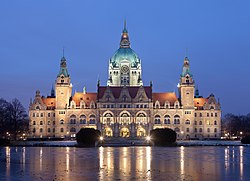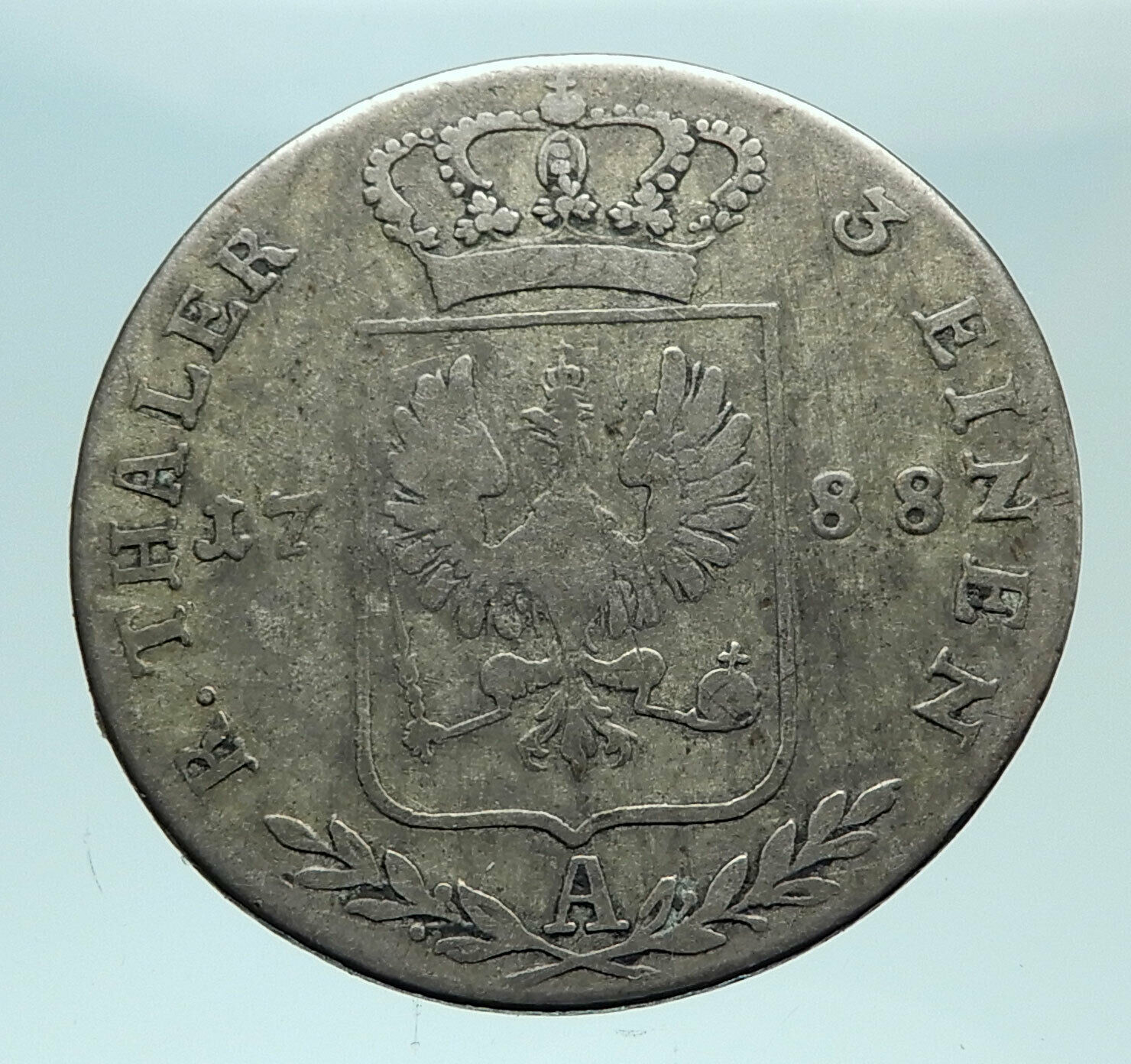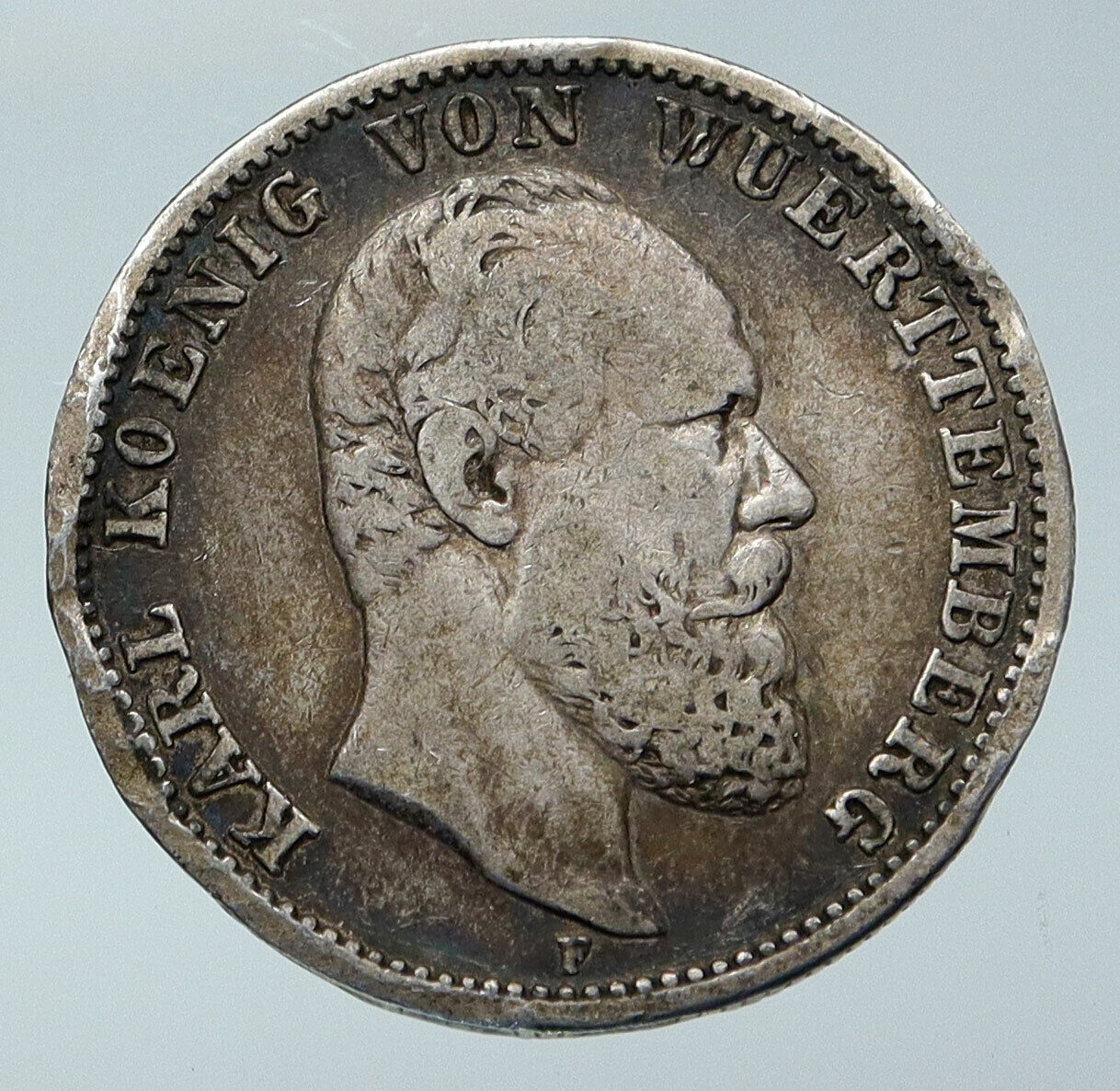|
German States – Hannover – Ruler: King George V
1866 B Silver Thaler
34mm (18.52 grams) 0.Silver (0.5359 oz. ASW)
Reference: KM#
230 (1857-66)
Certification: NGC
XF DETAILS 2863707-009
GEORG V. v.G.G. KOENIG v. HANNOVER B, George
facing left.
EIN VEREINSTHALER XXX EIN PFUND FEIN 18, Crowned Coat-of-arms and supporters.
Edge Lettering:
NEC ~*~ ASPERA ~*~ TERRENT ~*~
You are bidding on the exact item pictured, provided with a Certificate of Authenticity and Lifetime Guarantee of Authenticity.
 George V (George Frederick Ernest Albert; 3 June 1865 – 20 January 1936) was King of the United Kingdom and the British Dominions, and Emperor of India, from 6 May 1910 until his death in 1936. George V (George Frederick Ernest Albert; 3 June 1865 – 20 January 1936) was King of the United Kingdom and the British Dominions, and Emperor of India, from 6 May 1910 until his death in 1936.
He was the second son of Albert Edward, Prince of Wales (later King Edward VII), and the grandson of the reigning British monarch, Queen Victoria. From the time of his birth, he was third in the line of succession behind his father and his elder brother, Prince Albert Victor, Duke of Clarence and Avondale. From 1877 to 1891, George served in the Royal Navy, until the unexpected death of his elder brother in early 1892 put him directly in line for the throne. On the death of his grandmother in 1901, George’s father became King-Emperor of the British Empire, and George was created Prince of Wales. He succeeded his father in 1910. He was the only Emperor of India to be present at his own Delhi Durbar.
His reign saw the rise of socialism, communism, fascism, Irish republicanism, and the Indian independence movement, all of which radically changed the political landscape. The Parliament Act 1911 established the supremacy of the elected British House of Commons over the unelected House of Lords. As a result of the First World War (1914-18) the empires of his first cousins Tsar Nicholas II of Russia and Kaiser Wilhelm II of Germany fell while the British Empire expanded to its greatest effective extent. In 1917, George became the first monarch of the House of Windsor, which he renamed from the House of Saxe-Coburg and Gotha as a result of anti-German public sentiment. In 1924 he appointed the first Labour ministry and in 1931 the Statute of Westminster recognised the dominions of the Empire as separate, independent states within the Commonwealth of Nations. He was plagued by illness throughout much of his later reign and at his death was succeeded by his eldest son, Edward VIII.
Hanover or Hannover is the capital and largest city of the German federal state of Lower Saxony, and its 535,061 (2017) inhabitants make it the thirteenth largest city of Germany, as well as the third-largest city of Northern Germany after Hamburg and Bremen. The city lies at the confluence of the River Leine (progression: Aller→ Weser→ North Sea) and its tributary Ihme, in the south of the North German Plain, and is the largest city of the Hannover-Braunschweig-Göttingen-Wolfsburg Metropolitan Region. It is the fifth-largest city in the Low German dialect area after Hamburg, Dortmund, Essen, and Bremen.
 Before it became the capital of Lower Saxony in 1946, Hanover was the capital of the Principality of Calenberg (1636-1692), the Electorate of Brunswick-Lüneburg (1692-1814), the Kingdom of Hanover (1814-1866), the Province of Hanover of the Kingdom of Prussia (1868-1918), the Province of Hanover of the Free State of Prussia (1918-1946), and of the State of Hanover (1946). From 1714 to 1837, Hanover was by personal union the family seat of the Hanoverian Kings of the United Kingdom of Great Britain and Ireland, under their title of the dukes of Brunswick-Lüneburg (later described as the Elector of Hanover). Before it became the capital of Lower Saxony in 1946, Hanover was the capital of the Principality of Calenberg (1636-1692), the Electorate of Brunswick-Lüneburg (1692-1814), the Kingdom of Hanover (1814-1866), the Province of Hanover of the Kingdom of Prussia (1868-1918), the Province of Hanover of the Free State of Prussia (1918-1946), and of the State of Hanover (1946). From 1714 to 1837, Hanover was by personal union the family seat of the Hanoverian Kings of the United Kingdom of Great Britain and Ireland, under their title of the dukes of Brunswick-Lüneburg (later described as the Elector of Hanover).
The city is a major crossing point of railway lines and highways (Autobahnen), connecting European main lines in both the east-west (Berlin-Ruhr area/Düsseldorf/Cologne) and north-south (Hamburg-Frankfurt/Stuttgart/Munich) directions. Hannover Airport lies north of the city, in Langenhagen, and is Germany’s ninth-busiest airport. The city’s most notable institutions of higher education are the Hannover Medical School with its university hospital (Klinikum der Medizinischen Hochschule Hannover), and the University of Hanover.
The Hanover fairground, due to numerous extensions, especially for the Expo 2000, is the largest in the world. Hanover hosts annual commercial trade fairs such as the Hanover Fair and the CeBIT. The IAA Commercial Vehicles show takes place every two years. It is the world’s leading trade show for transport, logistics and mobility. Every year Hanover hosts the Schützenfest Hannover, the world’s largest marksmen’s festival, and the Oktoberfest Hannover.
“Hanover” is the traditional English spelling. The German spelling (with a double n) is becoming more popular in English; recent editions of encyclopedias prefer the German spelling, and the local government uses the German spelling on English websites. The English pronunciation, with stress on the first syllable, is applied to both the German and English spellings, which is different from German pronunciation, with stress on the second syllable and a long second vowel. The traditional English spelling is still used in historical contexts, especially when referring to the British House of Hanover.
|









 George V (George Frederick Ernest Albert; 3 June 1865 – 20 January 1936) was King of the United Kingdom and the British Dominions, and Emperor of India, from 6 May 1910 until his death in 1936.
George V (George Frederick Ernest Albert; 3 June 1865 – 20 January 1936) was King of the United Kingdom and the British Dominions, and Emperor of India, from 6 May 1910 until his death in 1936. Before it became the capital of Lower Saxony in 1946, Hanover was the capital of the Principality of Calenberg (1636-1692), the Electorate of Brunswick-Lüneburg (1692-1814), the Kingdom of Hanover (1814-1866), the Province of Hanover of the Kingdom of Prussia (1868-1918), the Province of Hanover of the Free State of Prussia (1918-1946), and of the State of Hanover (1946). From 1714 to 1837, Hanover was by personal union the family seat of the Hanoverian Kings of the United Kingdom of Great Britain and Ireland, under their title of the dukes of Brunswick-Lüneburg (later described as the Elector of Hanover).
Before it became the capital of Lower Saxony in 1946, Hanover was the capital of the Principality of Calenberg (1636-1692), the Electorate of Brunswick-Lüneburg (1692-1814), the Kingdom of Hanover (1814-1866), the Province of Hanover of the Kingdom of Prussia (1868-1918), the Province of Hanover of the Free State of Prussia (1918-1946), and of the State of Hanover (1946). From 1714 to 1837, Hanover was by personal union the family seat of the Hanoverian Kings of the United Kingdom of Great Britain and Ireland, under their title of the dukes of Brunswick-Lüneburg (later described as the Elector of Hanover). 




